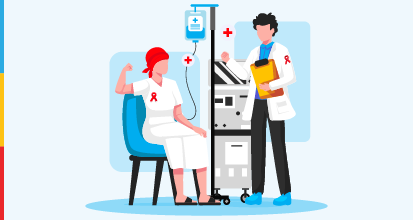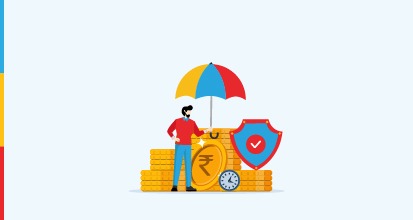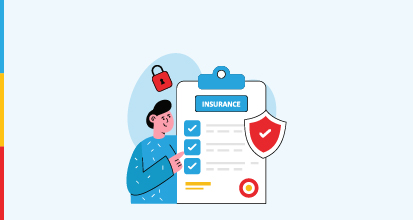- Critical Illness Insurance: A policy that provides a lump sum payout upon diagnosis of severe illnesses.
- Waiting Period: The amount of time the insurer has to wait before you can start to claim your health insurance.
- Sum Insured: The maximum amount the insurer pays if the policyholder is diagnosed with a covered illness.
- Pre-existing Condition: Any illness or medical condition diagnosed before buying the insurance policy.
- Section 80D: A tax provision that allows deductions on health insurance premiums, including critical illness plans.
Critical illness insurance covers specific life-threatening diseases that require expensive medical treatment or hospitalisation expenses. Critical illness insurance has become a crucial investment in today’s times, considering the increasing costs of healthcare. Critical Illness Insurance can be beneficial in case of life-threatening diseases such as a heart attack etc. There are other diseases that have a huge financial impact on the victim's family even after survival, i.e., cancer.
Such diseases that can cause double hardships for the family are also called critical illnesses. They can progress rapidly and unpredictably. The normal health insurance coverage is not enough to protect the family against such diseases. You will need critical illness insurance to cover your family from the setback due to such health problems.
You will need critical illness insurance to cover your family from the setback due to such health problems.
Key Takeaways
|
What is Critical Illness Insurance?
Critical illness insurance is a policy that provides lump-sum benefits against specific life-threatening critical diseases such as heart attack, cancer, renal failure etc. You can use this lump-sum coverage amount to pay for expensive medical treatments or hospitalisation expenses. This lump sum payout you receive in critical illness insurance is in addition to your prevalent health insurance policy.
Critical illness insurance covers life-threatening diseases like cancer, heart ailments, TB, renal failure, etc. The insurer may also arrange for a second opinion on the matter for you. Critical illness insurance plans provide lump sum money so that you can look after both your treatment and household expenses. The insurance policy works more like a life insurance plan and offers support regardless of the amount spent. Your premium for critical illness insurance is defined by your age and the amount of cover opted for.
Features of Critical Illness Cover
Critical illness insurance plans have features that allow them to be more useful for such situations. Here’s a list of the most important features of critical illness policy:
Monthly Income Pay Out Option: Critical illness plans offer monthly income benefits pay out with the claim. This benefit helps your family to manage household expenses well while you are undergoing treatment.
Lump-Sum Payment for Treatments: The critical illness policies pay a large part of the benefit as a lump sum. This amount will help you take care of all treatment-related costs for the illness or disability.
Coverage for a Large Number of Illnesses: Critical illness policies can cover more than 30 illnesses, health conditions, and disabilities.
Easy to Manage Policy: You can easily manage your critical illness policy online whether for premium payments, or claim settlement.
Begin securing your future
Application Status
Name
Date of Birth
Plan Name
Status
Name of the policy holder
Policy Holder NamePolicy No.
Policy NumberAddress of the Policyholder as per records
AddressUnclaimed Amount
Unclaimed Amount
Sorry! No records Found
Thank you for your interest in our product. Our financial expert will connect with you shortly to help you choose the best plan.
Benefits of Buying a Critical Illness Cover
Critical illness insurance offers multiple benefits to support your needs against critical illnesses. From financial assistance for treatment to the support for household expenses, here’s a list of benefits offered by critical illness insurance plans:
Adequate Financial Support against Critical Illnesses : With critical illness insurance, you can have a large sum available to you for financial support. The policy will release the large sum assured upon diagnosis. You’ll have adequate money to further your treatment and provide for the necessary expenses.
Major Critical Illnesses Covered : Critical illness insurance plans cover a majority of life-threatening health conditions. The covered illnesses include Parkinson’s, Alzheimer’s, lung, heart or renal failure, cardiovascular diseases and several cancerous developments. Some rare health conditions have also been included as part of critical illness insurance.
Protection against Disabilities : The best critical illness insurance plans also cover multiple disabilities as well. Thus, you can have additional insurance cover for permanent disabilities arising out of accident or illness. This includes loss of limbs, spinal cord injury, paralysis, etc.
Income Support: Critical illness plans offer financial support in lump sum as well as regular income. While the lump sum amount helps you take care of the treatment costs for critical illnesses, the regular sum will keep your household in order.
Extra Funds for Expensive Critical Illness Treatment : You can choose to increase the large sum assured in critical illness insurance. The cover will continue to grow until it doubles from its initial amount. This means you can stay prepared for the rising treatment costs for critical illnesses.
Tax Savings: The premium you pay for critical illness insurance qualifies for tax-deduction under section 80D. However, if you have included critical illness rider in your term plan you can claim the premium under section 80C.
Who Can Buy a Critical Illness Cover?
Anyone with an income can buy a critical illness policy. However, you can also buy critical illness insurance for dependent spouses and children. Overall, you should buy critical illness insurance if you fall under any of the following categories:
- You are above the age of 18 and earning.
- You have dependents or relatives who will be affected financially if you contract a serious illness or disability.
If you have a family history of certain illnesses, you will need critical illness insurance even more. So, even if you have to pay a nominally higher premium for it, it’s better to have the cover.
Why Should You Buy a Critical Illness Policy?
Critical illnesses are serious diseases that may lead to expensive and long-lasting treatments. Often, even after recovery, patients need to go through multiple therapies to lead a normal life again. They may suffer disabilities that need rehabilitation and significant modifications to the lifestyle of the entire family.
Thus, critical illness and disabilities have a double impact on your life:
- Added treatment, medical and recovery expenses
- Loss of income
Thus, you need large financial assistance to sail through this emergency situation. Critical illness policy is the best suitable option for you as it enables you to take care of both aspects together. Your critical illness policy will offer:
- A large lump sum amount for expenses
- Regular income payment (monthly) for a few years to enable smooth household function
How to Choose the Best Critical Illness Policy?
Selecting the best critical illness insurance plan involves looking for benefits and features most suitable for your conditions. Here’s a list of factors you can look at while selecting the best critical illness policy for yourself:
Age at Entry and Expiry: Buying critical illness insurance early gives you the benefit of large cover at lower costs. However, you should also look at the maximum age of holding the insurance. This is because the risk of critical illness grows with the age.
Sum Assured: You should be able to secure a large sum assured for your critical illness policy. Low sum assured limits can make your critical illness insurance ineffective.
Number of Critical Illnesses Covered: The more the better. Policies covering a large number of critical illnesses provide a wider umbrella of protection.
Inclusions & Exclusions : Always have a look at the terms and conditions of the policy before buying. This is where you will come to know of the inclusions, waiting period and excluded conditions in your critical illness policy.
Growing Critical Illness Cover: If you are buying critical illness insurance at a young age, you will need to increase your cover in the future due to rising costs. If your critical illness policy allows automatic increment you may not need another cover.
A term insurance calculator is a useful online tool that helps you determine how much coverage you need based on your income, lifestyle, and family’s needs.
The above calculation and illustration of figures are indicative only and not on actual basis.
How to Buy a Critical Illness Cover?
Select Policy Term and Sum Assured: The first thing is to select the correct policy term and sum assured. You should look for a policy term that ensures coverage at least up to 70 years of age. A sum assured which is about 10 times your annual income is good enough.
Add Critical Illness Rider: If you are buying term insurance with a critical illness rider, you may need to add the sum assured separately for a critical illness policy.
Premium Calculation: Estimate the premium for your critical illness cover by completing the basic information in the calculator. You can check the different premium amounts for different payment modes here.
Complete Application Form: Once you are satisfied with your standard premium estimates, you can start filling up your application form. Keep a digital copy of your medical and other KYC documents handy so that you can complete the process quickly.
Pay the Premium: Review the application form thoroughly and proceed with premium payment. You will be able to use your credit card and even wallets for premium payment.
Go Through Necessary Medical Check-up: If the insurer requires you may have to go through a medical check-up at the assigned clinic. Once your medical check is complete, the insurer will issue your critical insurance policy within 10 working days.
How to File a Claim for Critical Illness Plan?
Critical illness insurance claims require only diagnosis reports from a recognised medical institution. You can also inform your insurer as soon as a possibility arises. This will help your insurer to arrange for a second opinion for you.
You can submit the following documents to file a critical illness claim with your insurer:
- Claim form
- Hospital Certificate
- Original policy documents
- NEFT mandate attested by the bank and a cancelled cheque or bank passbook copy.
- Photo identity proof of the insured, i.e., copy of Passport, PAN card, Voter identity card, Aadhar (UID) card, etc.
- Hospital Certificate Form H
- Test/investigation report including all the clinical treatments like radiological, histological and laboratory test evidence
- Any other report confirming the diagnosis
- Leave a record of the past three years for salaried insured
Upon submitting these documents the insurer will begin the claim settlement process. The settlement usually takes between 5 to 10 working days if additional documents or investigation is not needed in the case.
Why is it Important to Buy a Term Insurance with Critical Illness Cover?
Cases of cancer and heart ailments have been rising throughout the world. And while the treatments are also improving, the diseases have so far stayed far ahead of the curve. Meaning the intervention in life-threatening illnesses is possible but could be expensive.
Many studies have pointed to cancer as one of the illnesses which can turn financially well-off upper-middle-class families into poor families. And cancer cases have been growing in India with double-digit rates.
In the past decade, cardiovascular diseases (CVD, i.e., heart-related ailments) have come up as one of the top causes of early deaths in the country. Between the decade starting 2007, CVD deaths registered a growth of almost 50% across age groups.
If that is not enough to concern you, about 50% of the total cases were registered among those below 50 years of age. Apart from CVD and cancer ailments, stroke and diabetes-related conditions have also been rising rapidly. The point to ponder is that stroke already has a place among the top 10 leading causes of death in India.
The majority of these conditions either had long-term treatments or the possibility of reversal. However, you have to be financially strong to go through them while taking care of your other responsibilities. This is why a term plan with critical illness cover is a better solution for you.
Factors to Consider Before Buying Critical Illness Insurance
Critical illness insurance provides coverage if you are diagnosed with a serious illness. Before purchasing a policy, consider these key factors:
Coverage Amount: Ensure the sum insured is enough to cover high medical costs.
Waiting Period: Check how long you need to wait to get insurance benefits.
Premium Costs: Compare premiums from different insurers to get a great mix of affordability and coverage.
Inclusions & Exclusions: Read the policy carefully to understand which illnesses they cover and where they draw the line, especially in case of pre-existing conditions or specific stages of diseases.
Tax Benefits Of Critical Illness Insurance
You can claim tax benefits on your critical illness insurance policy under Section 80D of the Income Tax Act, 1961. Here’s the table for you to refer to:
Insured Individuals | Deduction Amount |
Self, Spouse & Children (Below 60) | ₹25,000 |
Parents (Below 60) | ₹25,000 |
Parents (Above 60) | ₹50,000 |
Self & Spouse (Both Above 60) | ₹50,000 |
How is Critical Illness Cover Different from Disability and Accidental Cover?
Technically, critical illness policy covers the events related to illnesses and health conditions, while accidental cover deals with injuries from the accident. Even though both covers may overlap in certain areas but they are fundamentally different.
| Critical Illness Insurance | Disability & Accidental Cover |
|---|---|
| Covers health conditions and resulting developments | Covers accidental injuries and resulting health conditions |
| Only covers permanent disabilities | May offer partial benefits temporary disabilities |
| May not act if the insured does not survive for a given period | In the case of death due to an accident, the cover pays the benefit with term insurance cover |
Despite the differences in covered events and use of the insurance plans, both plans also enjoy a few similarities:
- Offer lump sum and regular income benefits
- Offer premium waiver option for the base term insurance in case of a disability claim
Thus, adding accidental and disability cover to your term plan with critical illness insurance will be a good idea to enhance your safety umbrella.
Glossary


Related Blogs









FAQs on Critical Illness Cover
A critical illness can include an illness, sickness or disease or a corrective measure. Few examples of these will include Cancer, Renal/Kidney failure, Coronary Artery Bypass (CAB) Surgery, Heart Attack (Myocardial Infarction), Heart Valve Surgery (HVT), Major Organ Transplant, Multiple Sclerosis, Primary Pulmonary Arterial Hypertension, Aorta graft surgery, Paralysis, Coma, Total Blindness and Stroke.
Typically the list of critical illnesses covered by insurance will include all health conditions which have the potential to deteriorate the quality of life unpredictably.
Typically the critical illness cover should be large enough to help you undergo the treatment, recover and resume your economic life. For this 5 to 10 times of your annual income should suffice. This is also about 50% of your term insurance cover need.
You can purchase critical illness insurance after being diagnosed with an illness usually covered by the policy. However, if the diagnosis has been established (or hinted with certain credibility) the insurer may issue the policy excluding the existing condition.
After you have submitted your application for the critical illness insurance cover, the insurer may ask you to go through a medical examination. The need for medical examination may vary from case to case, and depends largely on your and your family’s medical history, age and general health condition.
If you have already gone through a medical exam for specific reasons, you should disclose it in the application form.
You will need to submit the following documents while claiming your critical illness insurance benefits:
- Claim form
- Hospital Certificate
- Original policy documents
- NEFT mandate attested by the bank and a cancelled cheque or bank passbook copy
- Photo identity proof of the insured, i.e., copy of Passport, PAN card, Voter identity Aadhar (UID) card, etc card
- Hospital Certificate Form H
- Test/investigation report including all the clinical treatments like radiological, histological and laboratory test evidence
- Any other report confirming the diagnosis
- Leave record of the past three years (if salaried)
Critical illness cover is not expensive if bought at a young age. However, the benefits will far exceed the cost at any age you can buy the cover. Generally, the maximum age of entry into the plan is limited to the age after which insurance benefits weigh down due to the cost.
Standard term insurance policies only cover death regardless of the causes. However, online term insurance plans like iSelect Smart360 Term Plan from Canara HSBC Life Insurance covers critical illnesses by default. Otherwise, you can add a critical illness rider to your term insurance policy.
Yes, you can get a critical illness cover after cancer. However, the insurer may exclude pre-existing cancer and its related ailments from the cover. Also, a lot will depend on the extent of recovery you enjoy and your health post-recovery.
Examples of terminal illnesses include cancer, renal/kidney failure, coronary artery bypass (CAB) surgery, heart attack (myocardial infarction), benign brain tumour, heart valve surgery (HVT), major organ transplant, multiple sclerosis, primary pulmonary arterial hypertension, aorta graft surgery, paralysis, coma, total blindness and stroke.
Term Insurance - Top Selling Plans
Canara HSBC Life Insurance offers online term insurance plans to secure your family financially in your absence.
Family Shield: Enhanced Protection
- 3 Plan options
- Life cover till 99 years
- Steady income benefit
- Block your premium at inception
Start Young, Pay Less, Stay Secured
- Life cover till 99 years
- Coverage for spouse
- Block your premium rate
- Covers 40 critical illness
Family Shield: Enhanced Protection
- Affordable prices
- Multiple premium payment option
- Get Tax benefits
- Hassle-free purchase process
Popular Searches on Term Insurance
- Types of Term Insurance
- iSelect Smart360 Term Plan
- Term Insurance Plan
- 1 Crore Term Insurance
- 2 Crore Term Insurance
- 5 Crore Term Insurance
- Single Premium Term Plan
- Term Insurance Calculator
- Young Term Plan
- Term Insurance Tax Benefit
- Term Life Insurance Vs Life Insurance
- 50 Lac Term Insurance
- Zero Cost Term Insurance
- Temporary Total Disability

